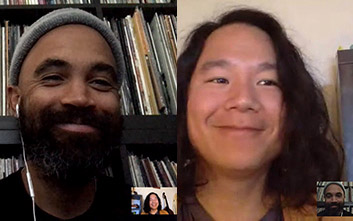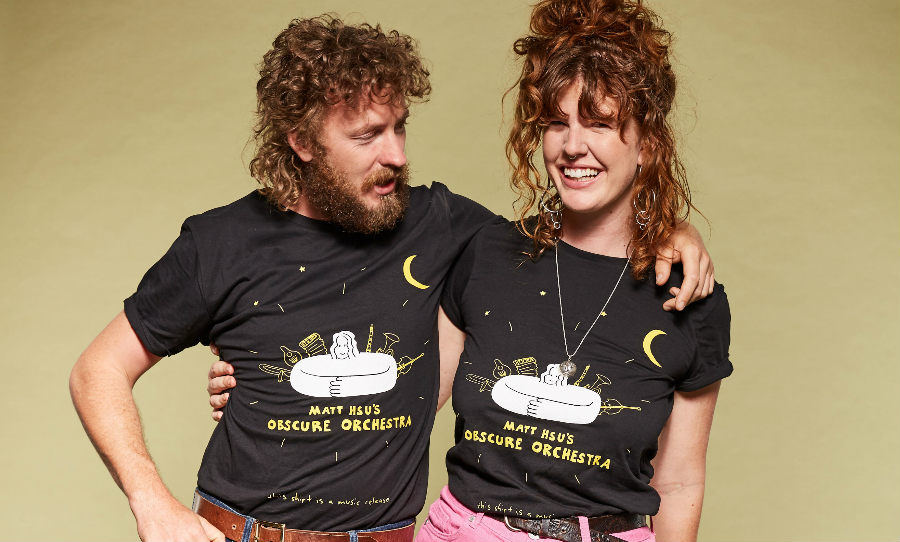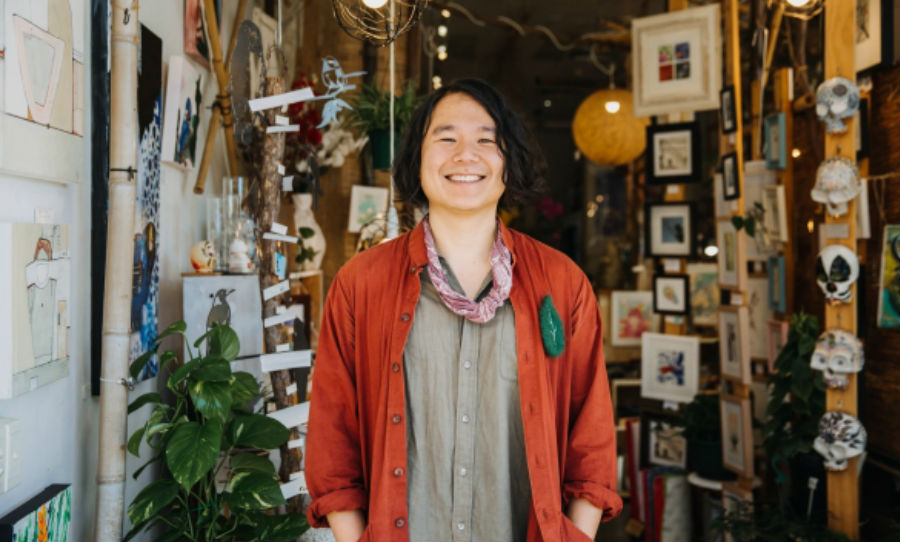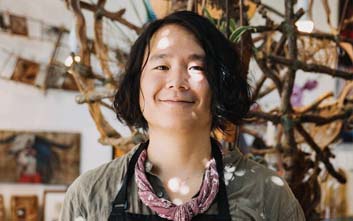Fleet Foxes are amid a sprawling world tour to break in their album Crack-Up, but for the next few weeks the band are taking a well-deserved breather back home. Framed by an impressive record collection at his home in Seattle, Morgan Henderson spends time talking to fellow multi-instrumentalist Matt Hsu’s Obscure Orchestra, who happens to be doing a PhD about indie-folk identity.
This artist-to-artist interview follows an unrecorded chat about Morgan’s love of running, his affinity for the queer community, and their shared appreciation of experimental musician Moondog. This time they looked deeper into diversity in music, Childish Gambino’s impact, the passing of Anthony Bourdain, the treatment of refugees, and the ‘folkification’ of culture (drinking jars, beards and raw wood everything).
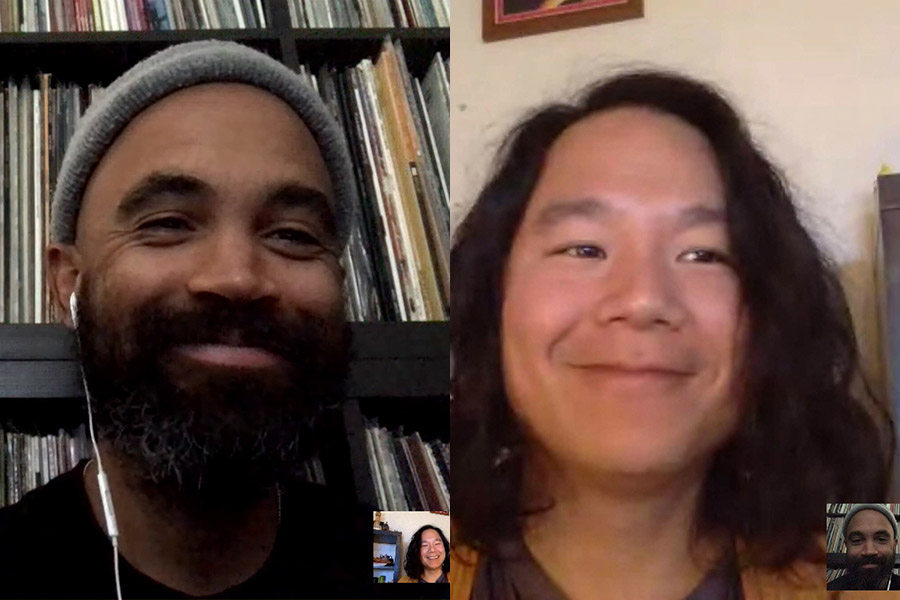
“I wonder, after a white supremacist rally or meeting, what they go eat. What if they went and they’re like, let’s go get some Thai food” — Morgan Henderson
Watch the entire interview or read excerpts below.
MATT: You have a film scoring project called Henderson-Maroon, which totally makes sense given your skillset. How’s that going?
MORGAN: It’s going well. So obviously I’m Henderson and Paul Maroon is the Maroon side. We met when Fleet Foxes toured with The Walkmen, that was the last band that he was in. We’ve done a handful of projects that were very fun to make and that we’re proud of. Actually this last Oscars, the first project that Paul worked on in our catalogue won an Oscar for Best Short, a movie called Heaven Is A Traffic Jam On The 405. So that’s how it’s going, it’s been cool.
MATT: In our last chat, we talked about your love of running. Then I realised in a lot of Fleet Foxes press photos, you’re wearing runners. So I wonder when you’re in a photo shoot (given the folky aesthetic of dark leather boots), are the band ever like ‘Again with the running shoes, Morgan!’
MORGAN: (laughs) I don’t know if they’ve said anything. They might’ve thought it, I don’t know. I think that as time goes on if you’re a runner it becomes difficult to wear any other shoe because they’re just more comfortable to be in. But also, one photoshoot in particular I thought we were going to have more time in between and I was going to go home and get non-running shoes and I turned out to not have the time, so I have running shoes on in photo because that’s the only shoes I had.
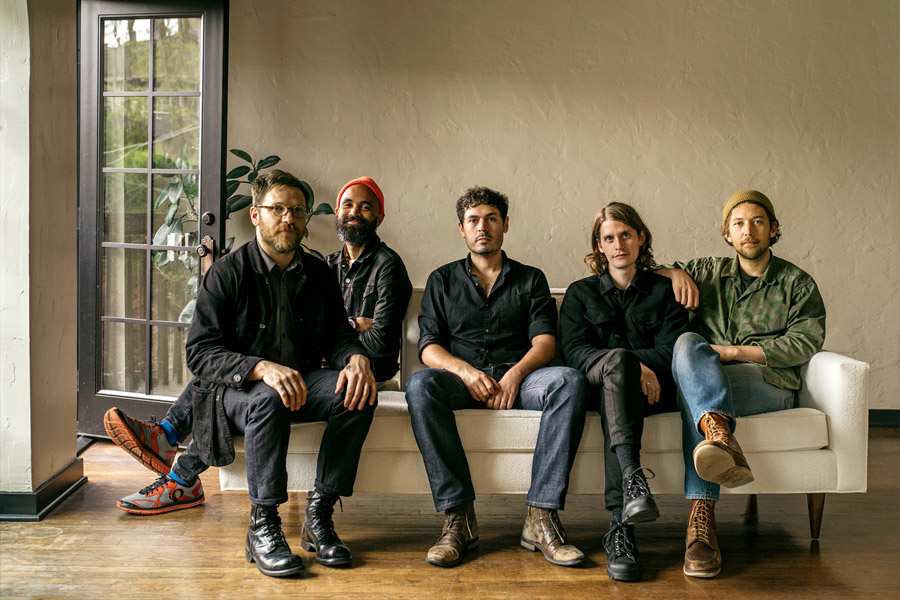
MATT: How much does each band member’s personal taste in music, style, and pop culture overlap?
MORGAN: Music wise, I don’t know, I think there’s overlaps. It’s hard for me to think of where everybody overlaps. I feel like Skye, more often than not, is the one playing music backstage, or between him and Casey, making the playlists before we play that people here that people hear in the club or wherever. There’s people we listen to in common, but some things I hear for the first time from him— yeah there’s a fair amount of overlap between our interests, musically and otherwise.
MATT: It seems like each album draws motifs or inspirations from places in the world — Montezuma, Mykonos, and in Crack-Up there’s some references to mountains in Japan… Odaigahara. Would that be correct?
MORGAN: That’s definitely a reference on Crack-Up. It seems like Robin [Pecknold] writes — or the imagery that he often pulls up is nature-related quite often, definitely earlier on than I’d say now.
MATT: I’ve noticed in indie-folk, gender is portrayed in very binary archetypes — men don this rugged lumberjack-esque ‘frontier spirit’ masculinity, while women in folk gravitate toward a maiden-like femininity. Is that something you’ve noticed too?
MORGAN: Well I don’t really pay attention to folk music, that’s not the music I listen to. I wouldn’t say I’m hyper aware of what the gender roles are in those genres. But I wouldn’t doubt it. I think the lumberjack and maiden trope is pretty strong and people fall into that for one reason or another, sure. But as far as the indie-folk world goes, I have no idea.
MATT: What are your thoughts about the perception that the indie music scene is quite insular and dominated by white guys with guitars?
“This Is America by Childish Gambino, that really struck a chord for me and a lot of other people. It just felt like we were just wowed […] it felt really significant to music and culture.” — Morgan
MORGAN: I think that there’s a reason based off of who’s interested in playing the music and who’s interested in listening to the music. I will say though that I spot just about every person within the stage view that I can see who’s brown at a Fleet Foxes show, and so they stand out to me. It is predominantly white people coming to Fleet Foxes shows in America and in Europe, but there’s also all sorts of ages and colours of people coming, which is great I think because ideally as an artist I wouldn’t necessarily make something that’s designed for one specific gender or type of person.
But also, by-and-large I really think that brown people are heavily influencing culture in every single way. I mean if you look at, at least in America, what’s happening in our politics, where there’s a lot of bristling right now is people from sports and predominantly they’re brown people. They’re the ones who are making statements on what they feel is right and wrong socially. If you look at music, I think one of the things that people talked about and were so excited about and felt like was really significant to music and culture, was This Is America by Childish Gambino, that really struck a chord for me and a lot of other people. It just felt like, they saw that and his previous record, and were just wowed by how it all felt. And maybe in the guitar playing folk indie scene there’s a lot of white guys with beards, but on the broader spectrum, I think that it gets somewhat more diverse as far as what people, I feel like, are really paying attention to.
MORGAN: What’s your perspective on how influenced Australian music is from anywhere else, and what’s that like in your view? Because there’s a lot of great Australia bands, My Disco are a hard heavy band but started to do some interesting electronic stuff too. To me there’s some great Aussie bands obviously.
MATT: In some ways I feel like we’re a young country in terms of culture. People struggle to point to specifically Australian foods because we’re by and large a country of immigrants, yet our native cultures have been so sidelined in mass culture for a long time. It’s ironic that Indigenous Australian cuisine isn’t a common thing, while the foods that are considered iconically Australian are British meat pies and fish and chips. Though, I think that somewhat undefined quality of contemporary Australian culture also means we’re unbeholden to ideas of musical lineage, so we can pick and choose we’re we draw influences from. Australian music can borrow heavily from its Western music peers, but can also has a wildcard quality. In my music, I like to explore the grey areas between cultures, because that’s my experience of being Australian.
MATT: In Crack-Up there seems to be a slight use of digital sound or keyboards. Is that something I’m hearing?
MORGAN: Well Skye definitely added some keyboards and things, because he’s gotten a lot more into the synthesised side of music as time has gone on. He still plays guitar and has a billion pedals but there’s definitely some keyboard elements in there.
MATT: And sampled sounds from nature?
MORGAN: Yeah, there’s a train in there and I’m sure there’s other bits in there that even I don’t know about.
“If you just based it off of food alone, we should want people from other cultures coming to our country and bringing their culture with them because we benefit” — Morgan
MATT: What Seattle food recommendations do you have that aren’t pho and energy bars (which Fleet Foxes lived off during the recording of Helplessness Blues)?
MORGAN: (laughs) Where do you live?
MATT: Brisbane, Australia.
MORGAN: Oh, that’s interesting because Casey [Wescott]’s wife is from Brisbane. I don’t remember what I ate in Brisbane specifically, but I found there to be a lot of great food in Australia, and especially South-East Asian food, which Seattle has a lot of and we’re really lucky for that. That’s something that when the politics of America and the politics of Australia, in this effort to keep people from coming to those countries — if you just based it off of the food alone — we should want people from other cultures coming to our country and bringing their culture with them because we benefit.
MATT: That’s so true. I think in Australia one of the biggest ways we connect with other cultures is through food first. Oh wow, ‘pasta is delicious… nice one Italian people’ decades ago, and pho and ramen now.
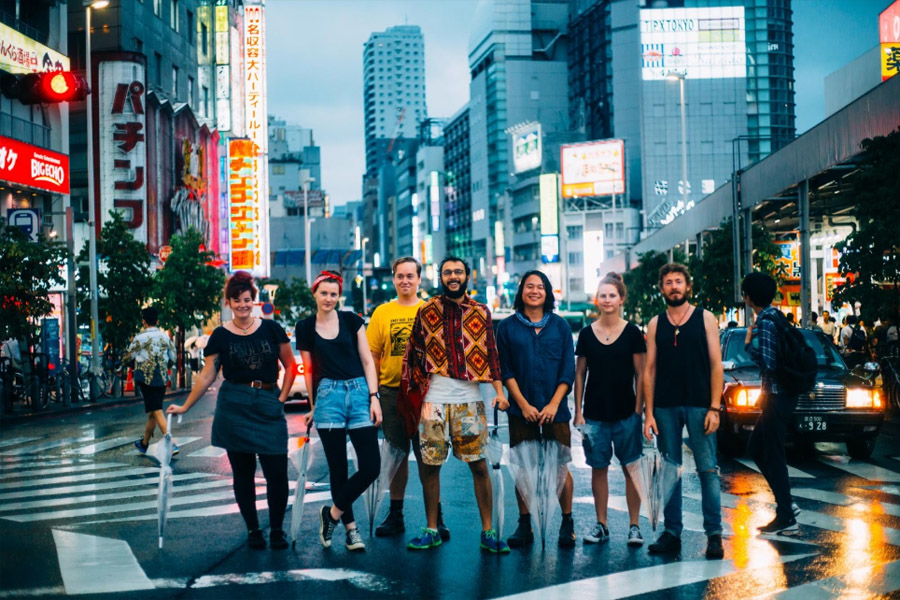
MORGAN: Well it’s interesting we talk about this now, this pretty famous writer and chef died yesterday in France, Anthony Bourdain. I think one of the things he was trying to get across is that we really benefit from engaging in each other’s food and that it really is a portal to each other, to each other’s culture, to each other personally, and on every level. I have a hard time imagining — it’s sort of interesting, I wonder, after a white supremacist rally or meeting, what they go eat. What if they went and they’re like, ‘let’s go get some Thai food’. Or what if they ate some pasta, which you know the noodle, from what I understand, didn’t originate from Italy but from Asia. Obviously you can eat whatever you want and believe in whatever you want, but it’s kind of like, we’re in each other’s cultures, so the idea of rejecting that is just backwards.
MATT: That’s really relevant to Australia right now because we have a really strict policy against refugees, and there are people dying on island camps.
MORGAN: I know. You’ve got to think back, at least in the States, we had internment camps where we sent Japanese people away. But look how generations later, at this point, that’s unthinkable. The way that we spoke about people as being these evil enemy foreigners. The way we’re speaking about Muslims in this country, I think you give it a couple of generations, it will hopefully be unthinkable.
MATT: As someone passionate about politics and people, is that something you ever want to combine with music, or just as a person of notability in the music scene?
MORGAN: I’m not a person to write a song with those kind of lyrics, but it’s been on my mind of a way to be useful in that way. I don’t know how that’d present itself but it’s crossed my mind.
MATT: Thanks so much for having this chat with me.
MORGAN: You’re welcome.
On top of his work on Fleet Foxes, you can listen to Morgan’s composing work at Henderson-Maroon.
Keep up with Matt Hsu’s Obscure Orchestra on Facebook, YouTube or Instagram.
